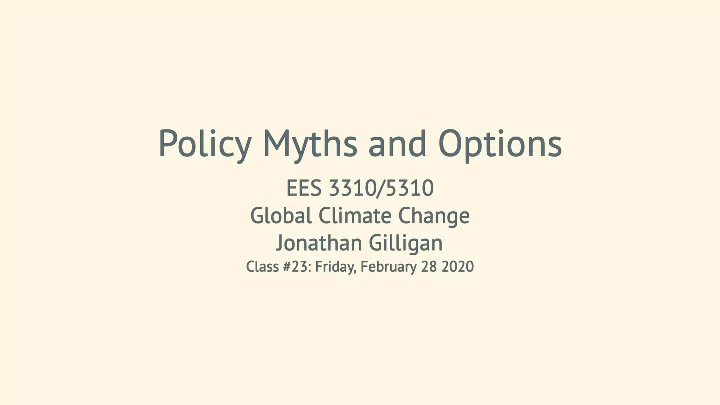

Policy Myths and Options Policy Myths and Options EES 3310/5310 EES 3310/5310 Global Climate Change Global Climate Change Jonathan Gilligan Jonathan Gilligan Class #23: Class #23: Friday, February 28 Friday, February 28 2020 2020
Announcement Announcement
Announcement Announcement Monday, March 10: Lab will meet in Stevenson 6740 (7th floor, EES Department) instead of our regular room. We will play a board game simulating converting New York City to renewable energy. I will post the rules for the game on Brightspace. Please read them before lab on Monday.
Pielke’s Lessons from Pielke’s Lessons from The Ozone Hole The Ozone Hole
Pielke’s Lessons from Pielke’s Lessons from the Ozone Hole the Ozone Hole 1970s: Significant scientific uncertainty Decision to take action without waiting for certainty Discovery of hole: tipping point “No regrets”" policy Flexible policy (renegotiate details every two years)
Policy Myths Policy Myths
Policy Myths Policy Myths 1. We lack political will 2. We must trade off the economy for the environment 3. We have all the technology we need
Myth 1: We Lack Political Will Myth 1: We Lack Political Will
Public Opinion: Is the Earth Warming Public Opinion: Is the Earth Warming Yale Program on Climate Communication: Climate Change in the American Mind: November 2019
::::::
Public Opinion: Cause of Warming? Public Opinion: Cause of Warming? Yale Program on Climate Communication: Climate Change in the American Mind: November 2019
Variation across polls Variation across polls
Partisan Split Partisan Split
Partisan Split: Partisan Split: Climate policy is the most divisive issue Greater partisan polarization than abortion Pew: As Economic Concerns Recede, Environmental Protection Rises on the Public’s Policy Agenda
Partisan split Partisan split Gallup: Americans’ Views on Global Warming, 2019 U.S. Concern About Global Warming at Eight-Year High (2016) Republican Skepticism Toward Global Warming Eases (2013) , ,
Polarization in Congress 1970–2015 Polarization in Congress 1970–2015 Data: League of Conservation Voters
Myth 2: Myth 2: We must trade off the economy We must trade off the economy for the environment for the environment
Willingness to pay (2009) Willingness to pay (2009) The Economist, Jul 1, 2009.
Iron Law of Climate Policy Iron Law of Climate Policy People want action on global warming But if climate policies conflict with economic growth, growth will win every time.
Frank Luntz (2010) Frank Luntz (2010) What has changed is that the American economy went to hell. And when you ask voters are they more concerned about destroying their environment over the next 100 years or rehabilitating their economy over the next 100 weeks, they’ll choose the economy over the environment any day. “Candidates Take Aim At Climate Bill To Win Votes” All Things Considered , NPR, 28 Oct. 2010 https://www.npr.org/templates/story/story.php?storyId=130888515
James Inhofe (2016) James Inhofe (2016) I assumed like everybody else, way back when everyone was talking about global warming and all that, I assumed that that was probably right, until I found out what it was going to cost Heritage Foundation Energy & Climate Policy Summit, Dec. 8, 2016 https://www.youtube.com/watch?v=surP84BQwhc
New Data New Data Nearly two-thirds of Americans ranked protecting the environment as a leading policy priority. — Pew survey (2020) By the widest margin since 2000, more Americans believe environmental protection should take precedence over economic growth. — Gallup Survey (2019) Source: Gallup: Preference for Environment Over Economy Largest Since 2000 (2019)
Public Opinion on Priorities (2015) Public Opinion on Priorities (2015)
Public Support for Policies (2017) Public Support for Policies (2017)
Political Will Political Will
Political Will Political Will Walter Lippmann (Pielke’s paraphrase): The goal of politics is not to get everyone to think alike, but to get people who think differently to act alike Cass Sunstein people can often agree on constitutional practices, and even on constitutional rights, when they cannot agree on constitutional theories … a major goal of a heterogeneous society [is] to make it possible to obtain agreement where agreement is necessary, and to make it unnecessary to obtain agreement where agreement is impossible.
Myth 3: Myth 3: We have all We have all the technology we need. the technology we need.
Do we have the technology? Do we have the technology? Image credit: S. Pacala & R. Socolow, Science 305 , 968 (2004). doi: 10.1126/science.1100103
Do we have the technology? Do we have the technology? R.A. Pielke, Jr. et al., Nature 452 , 531 (2008). doi: 10.1038/452531a Blue = Assumed spontaneous emissions reduction Brown = Regulations Yellow = Allowed emissions to stabilize CO 2 at 550 ppm.
Optimism on energy ef�ciency Optimism on energy ef�ciency R.A. Pielke, Jr. et al., Nature 452 , 531 (2008). doi: 10.1038/452531a
The View from 2018: The View from 2018: Pielke’s numbers focus on 2000–2005 The years when China’s economy began really rapid growth After 2005, things changed:
Current Emissions Pathways Current Emissions Pathways Comparing actual trends for 2005–2017 to trends for 2005–2020 in 5 emissions scenarios: Points above & right of the magenta line have higher emission trends than historical Points below & left of the magenta line have lower emission trends than historical The historical trend from 2005–2017 is doing better (lower emissions) than several scenarios including baseline (no policies) and RCP 6.0 (business as usual with current policies).
Do we have the technology? Do we have the technology? M.I. Hoffert, Science 329 , 1292 (2010) doi: 10.1126/science.1195449
Recommend
More recommend